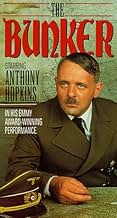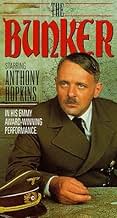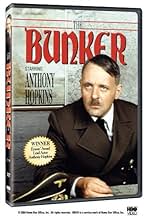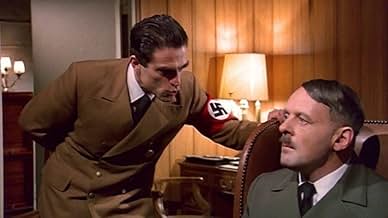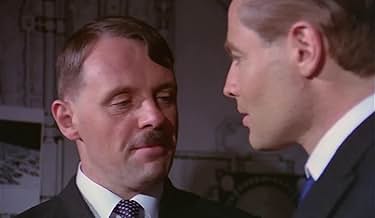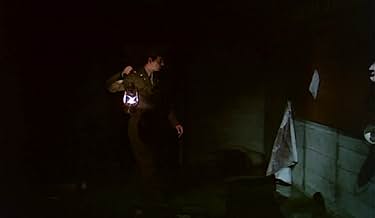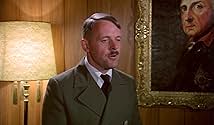The Bunker
- टीवी फ़िल्म
- 1981
- 2 घं 30 मि
IMDb रेटिंग
6.8/10
2.8 हज़ार
आपकी रेटिंग
अपनी भाषा में प्लॉट जोड़ेंDramatization depicting the events surrounding Adolf Hitler's (Sir Anthony Hopkins) last weeks in and around his underground bunker in Berlin before and during the battle for the city.Dramatization depicting the events surrounding Adolf Hitler's (Sir Anthony Hopkins) last weeks in and around his underground bunker in Berlin before and during the battle for the city.Dramatization depicting the events surrounding Adolf Hitler's (Sir Anthony Hopkins) last weeks in and around his underground bunker in Berlin before and during the battle for the city.
- 1 प्राइमटाइम एमी जीते
- 1 जीत और कुल 2 नामांकन
Georges Corraface
- Gard SS #1
- (as George Chorafas)
फ़ीचर्ड समीक्षाएं
Unless you understand the psychological make up of the German People and can clearly understand the German language it is hard to understand the absolute Charisma of Adolph Hitler or how the Third Reich came into being. This made for TV documentary is very accurate in its depictions, taken from interviews of an American officer over many years with the survivors of the events portrayed. The film chronicles the last 105 days of the life of Hitler and his inner circle from the moment he descends to the bunker in January 1945 until his death on April 30th of that year. Between the make-up and the acting of Anthony Hopkins you might well believe that Hitler was alive again, so compelling his performance. The late Richard Jordan gives one his finest performances as Reichsminister Albert Speer, Hitler's architect and later minister of munitions during the war. And to answer the carping critique of another commentator, everything I have read in history, which as it is my college major, is considerable, points to Speer's becoming a voice of reason and having a change of heart about the German Empire toward the end of the war. What was undeniable is the fact that those closest to him remained fanatically loyal, for the most part, some of them even pot the time that this film was made.
Two other outstanding performances were Michael Lonsdale (Moonraker) as Martin Borman and Piper Laurie as Magda Geobels, wife of Hitler's propaganda minister. She did kill her six children (or was it 7, I lost count) before dying with her husband in a suicide pact at the bunker. Whatever your feelings about Hitler, this film is a definite must see.
Two other outstanding performances were Michael Lonsdale (Moonraker) as Martin Borman and Piper Laurie as Magda Geobels, wife of Hitler's propaganda minister. She did kill her six children (or was it 7, I lost count) before dying with her husband in a suicide pact at the bunker. Whatever your feelings about Hitler, this film is a definite must see.
A stunning portrayal by Hopkins. Unfortunately the other cast members (the male ones anyway) do not look enough like the ghastly originals (!) to be convincing. For example, Goebbels is well enough acted, as are they all, but he just does not have the cadaverous look of Dr. Joseph. The Reich architect Speer is portrayed as far too nice a man. He wasn't. The exception is Bormann. Michael Lonsdale is made to look a little like this detestable man. In bearing, size and demeanor Lonsdale captures the essence of Hitler's right hand man He kept in the background most of the time, but was nonetheless an extremely powerful figure in the Third Reich and his power comes over very well. A good script and well directed, this film is well worth watching, especially now that it is readily available, uncut, on DVD.
What went on in the last days of the Third Reich in Adolf Hitler's bunker? This tv film dares to answer that question. It is a first class work that should be shown more often. Anthony Hopkins is one of our acting icons like Olivier. He brings the same chilling conviction to the role of Adolf Hitler that he brought to Hannibal Lecter in Silence Of The Lambs. He portrays Hitler as a drug addicted shell of a man who was once invincible and he captures him at the end when all was lost. The most frightning scene in the film is where he explodes in rage at Albert Speer when he tells him that the war is lost. Hopkins captures all of the rage and madness that was Adolf Hitler, a demon in human form. It is at this point that I wanted to tip my hat to another fine thespian, Susan Blakely, she plays Eva Braun. She gives a wonderful performance as well. She is a first class actress who has never given a bad performance in anything that she has done and who has never been given the credit due her. They talk in this film about how Albert Speer tried to assassinate Hitler in the final days of the Third Reich. This is a blatant whitewash. Speer was lucky to escape with his life at the Nuremburg trial, he got off with twenty years. People called him "the Nazi who said he was sorry". That is all BS!!!!Speer willingly served Hitler for years! He knew of the concentration camps and approved of it. He was in on it from the very beginning and the son of a bitch should have ended his life with a hangman's noose around his neck! There was a writer who wrote a book about Speer called Albert Speer The Whole Story and I highly recommend it.
The Third Reich was a land of insanity from its very beginning. That insanity increased as time went on, and this movie offers a pretty good look at its last days, as Hitler and his entourage hole themselves up in a bunker underneath the Reich Chancellory and act as if they're actually accomplishing something, even as Germany is being systematically overrun by Allied armies.
Of most interest are the various performances and the manner in which the various personalities are portrayed. Anthony Hopkins' work as Adolf Hitler was very good - especially considering the difficulties involved in playing such a complex and controversial subject. I thought Hopkins nailed the emotional complexity of the man - deliberately hiding himself from the realities of the War, calmly sitting down to tea with his secretaries one minute, then launching into a deranged tirade against his generals the next, addicted to drugs administered by his personal physician. Those who did makeup for this also got Hopkins to look the part - well not perfectly, but pretty close. Where I thought Hopkins missed the mark a bit was in Hitler's physical state. Aside from some trembling, Hopkins' Hitler actually looked pretty healthy. Other actors have to be looked at as well though, because this movie isn't really about Hitler - it has more to do with how the various personalities involved interacted with Hitler.
Much of the movie revolved around Nazi architect Albert Speer. Richard Jordan handled the part well, although the portrayal of Speer was interesting - probably unavoidably so, since Speer was almost as complex a character as Hitler. In the movie, Speer comes across as basically a good guy, fighting against Hitler's insane plans. There's truth to that view, but it's too limited. Speer was a devoted disciple of Hitler, and his actions against Hitler began only when it became obvious that Germany would lose the war. For Speer, as long as Germany might win, the horrors of Nazism seemed acceptable. Something was lacking in Cliff Gorman's portrayal of Joseph Goebbels. A lot was right - the portrayal of Goebbels' fanatical devotion to Hitler and Nazism, his rabid anti-semitism and his cold as ice attitude - to the point of killing his own family without a second thought simply because he felt that without Hitler, there was no reason for any of them to live. Still, something about Gorman as Goebbels didn't work for me. He just didn't look the part, and I could never really equate the voice with Goebbels either. The third figure of significance was Martin Bormann, portrayed by Michael Lonsdale. Lonsdale was good here. Bormann was a rather shadowy character, and Lonsdale portrayed him that way. You could never really be sure what Bormann's priority was here - getting out of the bunker or staying loyal to Hitler. In fact, that's accurate, because above everything else, Bormann's main preoccupation was with power - whether represented by Hitler or someone else.
Largely missing from this account of these last days in the bunker (although it does pop up in the end) is the rather morbid and completely unreal question of who would succeed Hitler - as if there was going to be anything to succeed to. As I understand it, that was a rather serious issue in the bunker in those last days and weeks; it gets largely passed over in this movie. Basically, however, this is very well done. I particularly liked the last scene, when the machinist Hentschel (Martin Jarvis) throws papers in disgust at the radio when it announces Hitler's heroic death, "fighting to the last breath against Bolshevism," when Hentschel knew full well that Hitler had cowardly committed suicide and left everyone else to fend for themselves. Overall, I give this a 7/10
Of most interest are the various performances and the manner in which the various personalities are portrayed. Anthony Hopkins' work as Adolf Hitler was very good - especially considering the difficulties involved in playing such a complex and controversial subject. I thought Hopkins nailed the emotional complexity of the man - deliberately hiding himself from the realities of the War, calmly sitting down to tea with his secretaries one minute, then launching into a deranged tirade against his generals the next, addicted to drugs administered by his personal physician. Those who did makeup for this also got Hopkins to look the part - well not perfectly, but pretty close. Where I thought Hopkins missed the mark a bit was in Hitler's physical state. Aside from some trembling, Hopkins' Hitler actually looked pretty healthy. Other actors have to be looked at as well though, because this movie isn't really about Hitler - it has more to do with how the various personalities involved interacted with Hitler.
Much of the movie revolved around Nazi architect Albert Speer. Richard Jordan handled the part well, although the portrayal of Speer was interesting - probably unavoidably so, since Speer was almost as complex a character as Hitler. In the movie, Speer comes across as basically a good guy, fighting against Hitler's insane plans. There's truth to that view, but it's too limited. Speer was a devoted disciple of Hitler, and his actions against Hitler began only when it became obvious that Germany would lose the war. For Speer, as long as Germany might win, the horrors of Nazism seemed acceptable. Something was lacking in Cliff Gorman's portrayal of Joseph Goebbels. A lot was right - the portrayal of Goebbels' fanatical devotion to Hitler and Nazism, his rabid anti-semitism and his cold as ice attitude - to the point of killing his own family without a second thought simply because he felt that without Hitler, there was no reason for any of them to live. Still, something about Gorman as Goebbels didn't work for me. He just didn't look the part, and I could never really equate the voice with Goebbels either. The third figure of significance was Martin Bormann, portrayed by Michael Lonsdale. Lonsdale was good here. Bormann was a rather shadowy character, and Lonsdale portrayed him that way. You could never really be sure what Bormann's priority was here - getting out of the bunker or staying loyal to Hitler. In fact, that's accurate, because above everything else, Bormann's main preoccupation was with power - whether represented by Hitler or someone else.
Largely missing from this account of these last days in the bunker (although it does pop up in the end) is the rather morbid and completely unreal question of who would succeed Hitler - as if there was going to be anything to succeed to. As I understand it, that was a rather serious issue in the bunker in those last days and weeks; it gets largely passed over in this movie. Basically, however, this is very well done. I particularly liked the last scene, when the machinist Hentschel (Martin Jarvis) throws papers in disgust at the radio when it announces Hitler's heroic death, "fighting to the last breath against Bolshevism," when Hentschel knew full well that Hitler had cowardly committed suicide and left everyone else to fend for themselves. Overall, I give this a 7/10
A tour de force performance by Hopkins manages to propel this sometimes slow-moving docudrama. The supporting performances, especially by Piper Laurie and Richard Jordan, also drive this intensely psychological take on the last days of the Third Reich. One criticism though: is a German accent really that difficult for professional actors to mimic?
क्या आपको पता है
- ट्रिवियाAfter viewing the dailies, one of the producers complained that Anthony Hopkins' portrayal of Adolf Hitler was too sympathetic. Hopkins replied that his portrayal was based on the premise that ultimately even Hitler was also human, and that's what's so horrific about him.
- गूफ़At the very end of the movie, the SS man/switchboard operator, Misch is seen talking to mechanic Hentschel while preparing to flee "The Bunker". The rifle Misch has shouldered is a Russian Mosin Nagant; he would have been carrying the German Mauser of which plenty would have been available with all the wounded in the proximity. It's unlikely anyone would have taken a Russian weapon down into Hitler's Bunker.
- भाव
Albert Speer: The war is lost.
Adolf Hitler: [shouting] The war is not lost! The war is not lost! The war will never be lost! We're gonna beat'em, we're gonna beat'em all!
- कनेक्शनFeatured in The 33rd Annual Primetime Emmy Awards (1981)
टॉप पसंद
रेटिंग देने के लिए साइन-इन करें और वैयक्तिकृत सुझावों के लिए वॉचलिस्ट करें
विवरण
इस पेज में योगदान दें
किसी बदलाव का सुझाव दें या अनुपलब्ध कॉन्टेंट जोड़ें

